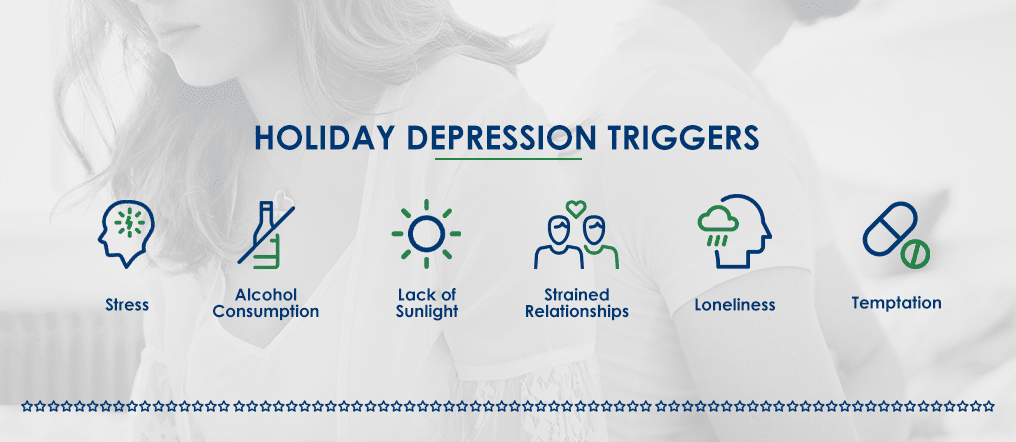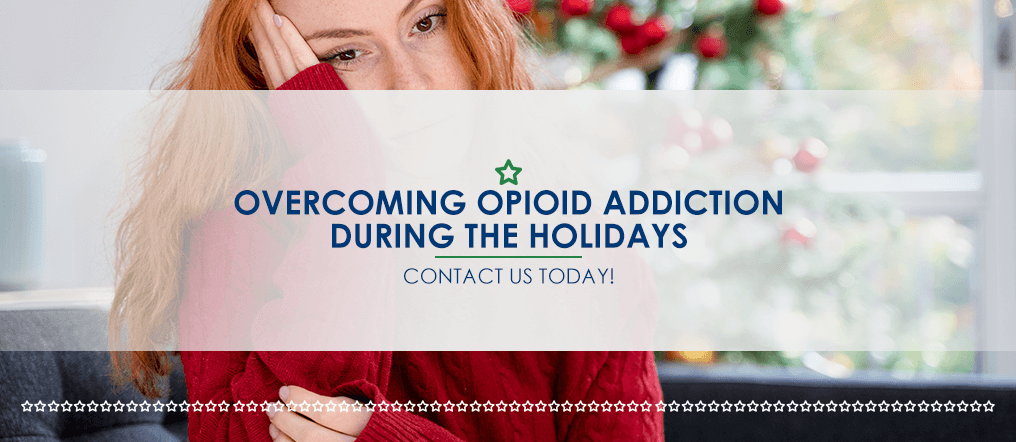The holiday season is meant to be filled with joyous festivities and happy memories, but for many Americans, the winter months are anything but cheerful. According to the National Alliance on Mental Illness (NAMI), approximately 64% of people with a mental health issue say the holidays worsen their condition. Considering nearly one in five American adults live with a mental illness, it’s common for people to experience difficulty during the holidays.
People become depressed or anxious around the holidays for many reasons, from experiencing financial stress to coping with isolation. For those who also have a substance use disorder, dealing with holiday depression can be even more challenging. If you’re experiencing the “holiday blues,” know that you’re not alone, and there are healthy ways to manage feelings of sadness, stress or loneliness.

Holiday Depression Triggers
Depression is a common disorder, affecting one in 15 adults in any given year. Although depression is highly treatable, symptoms can return following a trigger. During the holidays, people face an increased number of potential depression triggers, such as overwhelming stress and alcohol consumption. One way to minimize the effect of holiday-related triggers is to recognize the situations that may impact your mental and emotional state so you can prepare accordingly. Here’s a list of common triggers:
Stress
The holidays can be highly stressful due to financial strain, unrealistic expectations and the pressure to be happy and social. A 2019 survey conducted by Total Brain found that nearly 40% of Americans would skip the holiday season to avoid the stress it causes. According to a Healthline survey, about 62% of respondents feel very or somewhat stressed during the holidays, and the top stressors include finances, making the right gift choices and eating healthy.
Holiday anxieties can overwhelm a person’s ability to cope with negative thoughts and feelings and lead to depression. While these symptoms may only be temporary, they can also be more severe and last for weeks. Stress is also a common relapse trigger for individuals in recovery.
Alcohol Consumption
People tend to drink more during the holidays as they attend parties and use alcohol to deal with stress or social anxiety. Alcohol can worsen the symptoms of depression or anxiety and contribute to poor decision-making. For example, people might drink and drive after a party, putting their lives and the lives of others at risk. According to the National Highway Traffic Safety Administration, in 2018, there were 285 fatalities resulting from drunk driving between Christmas and New Year’s.
Lack of Sunlight
According to Mental Health America, about 5% of the U.S. population will experience seasonal depression in a given year due to the shorter days and lack of sunlight in the fall and winter. The decreased level of sunlight can affect a person’s serotonin levels, leading to depression or an overall low mood. Shorter, darker days also increase melatonin production, which has been linked to seasonal depression and can impact a person’s usual sleep pattern.
Strained Relationships
For some people, getting together with family during the holidays is a draining or aggravating experience and can trigger depression and anxiety symptoms. You may try to please all of your relatives, for example, which can increase stress and the pressure to make everyone happy. Conversely, if you’re not speaking to relatives during the holidays due to conflict, you might feel sad, resentful or guilty. All of these challenging emotions can lead to a depressive episode.
Loneliness
If you’re recently divorced, estranged or grieving the loss of a loved one, the holidays can feel empty or filled with sad memories — but you’re not alone. A lot of Americans feel lonely during the holidays.
For example, two in 10 Americans describe themselves as very lonely or sad during the holidays, according to a 2019 poll from the Associated Press-NORC Center for Public Affairs Research. According to a NAMI survey, half of the respondents say they were unable to be with loved ones during the holidays, and 55% claim they found themselves thinking of happier times in the past that no longer exist.
Social isolation and loneliness has been linked to a range of health issues, including depression.
Temptation
The holidays can be extremely stressful for individuals in recovery from addiction. A recovering individual may feel tempted to use drugs or alcohol to cope with holiday-related stress, anxiety, depression or loneliness.
Also, people in recovery may feel pressured to attend gatherings where alcohol or drugs are present or be around family members who might trigger painful emotions. In other words, staying sober during the holidays can be difficult without a plan in place.
How to Manage Holiday Depression
If you’re worried the holidays will trigger depression or a substance use disorder relapse, know that there are ways to manage stress and challenging emotions before they overwhelm you. Here are tips for coping with the holidays, no matter what the season brings:
- Plan for triggers: Know what causes you to feel depressed or anxious, and have a strategy for dealing with these triggers before they arise. For example, if you’re spending the holidays in recovery, you might plan to leave a party early to avoid late-night drinking or substance use. If you’re not sure how to handle triggers, contact a therapist in advance.
- Reach out to others: It’s hard to miss loved ones who are no longer with you or to wish you had relationships you see others enjoy during the holidays. If you feel lonely, resist staying isolated, and reach out to others who may also be coping with loneliness. If you don’t have any friends or family to connect with, consider volunteering to help those in need.
- Get enough rest: Don’t let holiday stress wear you down. Make sure to set aside time for yourself to rest, relax and explore your feelings. If you feel sad, lonely or misunderstood, permit yourself to cry or express your feelings, and don’t force yourself to feel happy.
- Avoid overspending: There’s no need to buy gifts you can’t afford. Let your family members know that you care about them, but you cannot afford to spend too much on gifts this year, even though you would like to. This can relieve stress and pressure and give you a chance to nourish your relationships.
- Set realistic expectations: The holidays do not need to be perfect or like they were in the past. Families and individuals change and grow with time, and that’s all right. Take the pressure off yourself to have a perfect season, and instead, set realistic expectations, and focus on enjoying the present moment.
- Learn to say no: If you’re stressing out about attending a party or other holiday event, consider saying no. You do not have to go to every holiday-related activity, especially if you’re concerned it will cause depression or trigger a relapse.
- Stick to healthy habits: The holidays can easily lead to overindulgence and feelings of regret. Prioritize healthy habits such as staying active, eating healthy and getting adequate sleep.
- Seek counseling: If the holidays cause you to feel overwhelmed by sadness, stress or grief, reach out to a mental health professional. A counselor can help you manage depression symptoms, cope with difficult thoughts and feelings and regain a sense of hope. If you need treatment for an addiction, consider contacting a rehab facility.
Overcoming Opioid Addiction During the Holidays
If you’re struggling with opioid addiction or are in recovery, the holidays can be an incredibly difficult time. Addiction is a lifelong disease that requires regular treatment and support, and the holidays can make symptoms worse. At AppleGate Recovery, we understand that opioid addiction is a complex, recurring illness that often coincides with a mental health issue like depression or anxiety. Addiction is also a treatable disease, and there’s hope for you, no matter how long you’ve been using opioids.
AppleGate Recovery specializes in Office-Based Opioid Treatment, providing medication-assisted treatment, counseling and other recovery services for opioid addiction. If you’re ready to work on your recovery without having to put your life on hold, we’re here for you at AppleGate Recovery. Please contact us today to learn more about our treatment services or to sign up for an appointment.

Contact AppleGate Recovery Today
If opioid addiction is impacting your life or the life of someone you care about, reach out to our treatment center. We are here to provide the support and care you need to take the first step toward recovery.
Call 888.488.5337
